- Home
- Lemony Snicket
The End asoue-13 Page 11
The End asoue-13 Read online
Page 11
"But you can't read every story, and answer every question," Klaus said, "even if you'd like to."
Ishmael smiled and tugged at his beard. "That's just what your parents told me," he said. "When I arrived here they'd been on the island a few months, but they'd become the colony's facilitators, and had suggested some new customs. Your father had suggested that a few castaway construction workers install the periscope in the tree, to search for storms, and your mother had suggested that a shipwrecked plumber devise a water filtration system, so the colony could have fresh water, right from the kitchen sink. Your parents had begun a library from all the documents that were here, and were adding hundreds of stories to the commonplace book. Gourmet meals were served, and your parents had convinced some of the other castaways to expand this underground space." He gestured to the long bookshelf, which disappeared into the darkness. "They wanted to dig a passageway that would lead to a marine research center and rhetorical advice service some miles away." The Baudelaires exchanged amazed looks. Captain Widdershins had described such a place, and in fact the children had spent some desperate hours in its ruined basement. "You mean if we walk along the bookcase," Klaus said, "we'll reach Anwhistle Aquatics?"
Ishmael shook his head. "The passageway was never finished," he said, "and it's a good thing, too. The research center was destroyed in a fire, which might have spread through the passageway and reached the island. And it turned out that a very deadly fungus was contained in that place. I shudder to think what might happen if the Medusoid Mycelium ever reached these shores."
The Baudelaires looked at one another again, but said nothing, preferring to keep one of their secrets even as Ishmael told them some of his own. The story of the Baudelaire children may have connected with Ishmael's story of the spores contained in the diving helmet Count Olaf was hiding under his gown in the bird cage in which he was a prisoner, but the siblings saw no reason to volunteer this information.
"Some islanders thought the passage was a wonderful idea," Ishmael continued. "Your parents wanted to carry all of the documents that had washed up here to Anwhistle Aquatics, where they might be sent to a sub-sub-librarian who had a secret library. Others wanted to keep the island safe, far from the treachery of the world. By the time I arrived, some islanders wanted to mutiny, and abandon your parents on the coastal shelf." The facilitator heaved a great sigh, and closed the heavy book in his lap. "I walked into the middle of this story," he said, "just as you walked into the middle of mine. Some of the islanders had found weapons in the detritus, and the situation might have become violent if I hadn't convinced the colony to simply abandon your parents. We allowed them to pack a few books into a fishing boat your father had built, and in the morning they left with a few of their comrades as the coastal shelf flooded. They left behind everything they'd created here, from the periscope I use to predict the weather to the commonplace book where I continue their research."
"You drove our parents away?" Violet asked in amazement.
"They were very sad to go," Ishmael said. "Your mother was pregnant with you, Violet, and after all of their years with V.F.D. your parents weren't sure they wanted their children exposed to the world's treachery. But they didn't understand that if the passageway had been completed, you would have been exposed to the world's treachery in any case. Sooner or later, everyone's story has an unfortunate event or two—a schism or a death, a fire or a mutiny, the loss of a home or the destruction of a tea set. The only solution, of course, is to stay as far away from the world as possible and lead a safe, simple life."
"That's why you keep so many items away from the others," Klaus said.
"It depends on how you look at it," Ishmael said. "I wanted this place to be as safe as possible, so when I became the island's facilitator, I suggested some new customs myself. I moved the colony to the other side of the island, and I trained the sheep to drag the weapons away, and then the books and mechanical devices, so none of the world's detritus would interfere with our safety. I suggested we all dress alike, and eat the same meals, to avoid any future schisms."
" Jojishoji," Sunny said, which meant something like, "I don't believe that abridging the freedom of expression and the free exercise thereof is the proper way to run a community."
"Sunny's right," Violet said. "The other islanders couldn't have agreed with these new customs."
"I didn't force them," Ishmael said, "but, of course, the coconut cordial helped. The fermented beverage is so strong that it serves as a sort of opiate for the people here."
"Lethe?" Sunny asked.
"An opiate is something that makes people drowsy and inactive," Klaus said, "or even forgetful."
"The more cordial the islanders drank," Ishmael explained, "the less they thought about the past, or complained about the things they were missing."
"That's why hardly anyone leaves this place," Violet said. "They're too drowsy to think about leaving."
"Occasionally someone leaves," Ishmael said, and looked down at the Incredibly Deadly Viper, who gave him a brief hiss. "Some time ago, two women sailed off with this very snake, and a few years later, a man named Thursday left with a few comrades."
"So Thursday is alive," Klaus said, "just like Kit said."
"Yes," Ishmael admitted, "but at my suggestion, Miranda told her daughter that he died in a storm, so she wouldn't worry about the schism that divided her parents."
"Electra," Sunny said, which meant "A family shouldn't keep such terrible secrets," but Ishmael did not ask for a translation.
"Except for those troublemakers," he said, "everyone has stayed here. And why shouldn't they? Most of the castaways are orphans, like me, and like you. I know your story, Baudelaires, from all the newspaper articles, police reports, financial newsletters, telegrams, private correspondence, and fortune cookies that have washed up here. You've been wandering this treacherous world since your story began, and you've never found a place as safe as this one. Why don't you stay? Give up your mechanical inventions and your reading and your cooking. Forget about Count Olaf and V.F.D. Leave your ribbon, and your commonplace book, and your whisk, and your raft library, and lead a simple, safe life on our shores."
"What about Kit?" Violet asked.
"In my experience, the Snickets are as much trouble as the Baudelaires," Ishmael said. "That's why I suggested you leave her on the coastal shelf, so she wouldn't make trouble for the colony. But if you can be convinced to choose a simpler life, I suppose she can, too."
The Baudelaires looked at one another doubtfully. They already knew that Kit wanted to return to the world and make sure justice was served, and as volunteers they should have been eager to join her. But Violet, Klaus, and Sunny were not sure they could abandon the first safe place they had found, even if it was a little dull. "Can't we stay here," Klaus asked, "and lead a more complicated life, with the items and documents here in the arboretum?"
"And spices?" Sunny added.
"And keep them a secret from the other islanders?" Ishmael said with a frown.
"That's what you're doing," Klaus couldn't help pointing out. "All day long you sit in your chair and make sure the island is safe from the detritus of the world, but then you sneak off to the arboretum on your perfectly healthy feet and write in a commonplace book while snacking on bitter apples. You want everyone to lead a simple, safe life—everyone except yourself."
"No one should lead the life I lead," Ishmael said, with a long, sad tug on his beard. "I've spent countless years cataloging all of the objects that have washed up on these shores and all the stories those objects tell. I've repaired all the documents that the storms have damaged, and taken notes on every detail. I've read more of the world's treacherous history than almost anyone, and as one of my colleagues once said, this history is indeed little more than the register of crimes, follies, and misfortunes of mankind."
"Gibbon," Sunny said. She meant something like, "We want to read this history, no matter how miserable it is," and her siblings
were quick to translate. But Ishmael tugged at his beard again, and shook his head firmly at the three children.
"Don't you see?" he asked. "I'm not just the island's facilitator. I'm the island's parent. I keep this library far away from the people under my care, so that they will never be disturbed by the world's terrible secrets." The facilitator reached into a pocket of his robe and held out a small object. The Baudelaires saw that it was an ornate ring, emblazoned with the initial R, and stared at it, quite puzzled.
Ishmael opened the enormous volume in his lap, and turned a few pages to read from his notes. "This ring," he said, "once belonged to the Duchess of Winnipeg, who gave it to her daughter, who was also the Duchess of Winnipeg, who gave it to her daughter, and so on and so on and so on. Eventually, the last Duchess of Winnipeg joined V.F.D., and gave it to Kit Snicket's brother. He gave it to your mother. For reasons I still don't understand, she gave it back to him, and he gave it to Kit, and Kit gave it to your father, who gave it to your mother when they were married. She kept it locked in a wooden box that could only be opened by a key that was kept in a wooden box that could only be opened by a code that Kit Snicket learned from her grandfather. The wooden box turned to ashes in the fire that destroyed the Baudelaire mansion, and Captain Widdershins found the ring in the wreckage only to lose it in a storm at sea, which eventually washed it onto our shores."
" Neiklot?" Sunny asked, which meant "Why are you telling us about this ring?"
"The point of the story isn't the ring," Ishmael said. "It's the fact that you've never seen it until this moment. This ring, with its long secret history, was in your home for years, and your parents never mentioned it. Your parents never told you about the Duchess of Winnipeg, or Captain Widdershins, or the Snicket siblings, or V.F.D. Your parents never told you they'd lived here, or that they were forced to leave, or any other details of their own unfortunate history. They never told you their whole story."
"Then let us read that book," Klaus said, "so we can find out for ourselves."
Ishmael shook his head. "You don't understand," he said, which is something the middle Baudelaire never liked to be told. "Your parents didn't tell you these things because they wanted to shelter you, just as this apple tree shelters the items in the arboretum from the island's frequent storms, and just as I shelter the colony from the complicated history of the world. No sensible parent would let their child read even the title of this dreadful, sad chronicle, when they could keep them far from the treachery of the world instead. Now that you've ended up here, don't you want to respect their wishes?" He closed the book again, and stood up, gazing at all three Baudelaires in turn. "Just because your parents have died," he said quietly, "doesn't mean they've failed you. Not if you stay here and lead the life they wanted you to lead." Violet thought of her mother again, bringing the cup of star anise tea on that restless evening. "Are you sure this is what our parents would have wanted?" she asked, not knowing if she could trust his answer.
"If they didn't want to keep you safe," he said, "they would have told you everything, so you could add another chapter to this unfortunate history." He put the book down on the reading chair, and put the ring in Violet's hand. "You belong here, Baudelaires, on this island and under my care. I'll tell the islanders that you've changed your minds, and that you're abandoning your troublesome past."
"Will they support you?" Violet asked, thinking of Erewhon and Finn and their plan to mutiny at breakfast.
"Of course they will," Ishmael said. "The life we lead here on the island is better than the treachery of the world. Leave the arboretum with me, children, and you can join us for breakfast."
"And cordial," Klaus said.
"No apples," Sunny said.
Ishmael gave the children one last nod, and led the children up through the gap in the roots of the tree, turning off the lights as he went. The Baudelaires stepped out into the arboretum, and looked back one last time at the secret space. In the dim light they could just make out the shape of the Incredibly Deadly Viper, who slithered over Ishmael's commonplace book and followed the children into the morning air. The sun filtered through the shade of the enormous apple tree, and shone on the gold block letters on the spine of the book. The children wondered whether the letters had been printed there by their parents, or perhaps by the previous writer of the commonplace book, or the writer before that, or the writer before that. They wondered how many stories the oddly titled history contained, and how many people had gazed at the gold lettering before paging through the previous crimes, follies, and misfortunes and adding more of their own, like the thin layers of an onion. As they walked out of the arboretum, led by their clay-footed facilitator, the Baudelaire orphans wondered about their own unfortunate history, and that of their parents and all the other castaways who had washed up on the shores of the island, adding chapter upon chapter to A Series of Unfortunate Events.
ChapterEleven
Perhaps one night, when you were very small, someone tucked you into bed and read you a story called "The Little Engine That Could," and if so then you have my profound sympathies, as it is one of the most tedious stories on Earth. The story probably put you right to sleep, which is the reason it is read to children, so I will remind you that the story involves the engine of a train that for some reason has the ability to think and talk. Someone asks the Little Engine That Could to do a difficult task too dull for me to describe, and the engine isn't sure it can accomplish this, but it begins to mutter to itself, "I think I can, I think I can, I think I can," and before long it has muttered its way to success. The moral of the story is that if you tell yourself you can do something, then you can actually do it, a moral easily disproved if you tell yourself that you can eat nine pints of ice cream in a single sitting, or that you can shipwreck yourself on a distant island simply by setting off in a rented canoe with holes sawed in it.
I only mention the story of the Little Engine That Could so that when I say that the Baudelaire orphans, as they left the arboretum with Ishmael and headed back toward the island colony, were on board the Little Engine That Couldn't, you will understand what I mean. For one thing, the children were being dragged back to Ishmael's tent on the large wooden sleigh, helmed by Ishmael in his enormous clay chair and dragged by the island's wild sheep, and if you have ever wondered why horse-drawn carriages and dogsleds are far more common modes of travel than sheep-dragged sleighs, it is because sheep are not well-suited for employment in the transportation industry. The sheep meandered and detoured, lollygagged and moseyed, and occasionally stopped to nibble on wild grass or simply breathe in the morning air, and Ishmael tried to convince the sheep to go faster through his facilitation skills, rather than through standard shepherding procedures. "I don't want to force you," he kept saying, "but perhaps you sheep could go a bit faster," and the sheep would merely stare blankly at the old man and keep shuffling along.
But the Baudelaire orphans were on board the Little Engine That Couldn't not only because of the sheep's languor—a word which here means "inability to pull a large, wooden sleigh at a reasonable pace" — but because their own thoughts were not spurring them to action. Unlike the engine in the tedious story, no matter what Violet, Klaus, and Sunny told themselves, they could not imagine a successful solution to their difficulties. The children tried to tell themselves that they would do as Ishmael had suggested, and lead a safe life on the colony, but they could not imagine abandoning Kit Snicket on the coastal shelf, or letting her return to the world to see that justice would be served without accompanying her on this noble errand. The siblings tried to tell themselves that they would obey their parents' wishes, and stay sheltered from their unfortunate history, but they did not think that they could keep themselves away from the arboretum, or from reading what their parents had written in the enormous book. The Baudelaires tried to tell themselves that they would join Erewhon and Finn in the mutiny at breakfast, but they could not picture threatening the facilitator and his supporters with weapons,
particularly because they had not brought any from the arboretum. They tried to tell themselves that at least they could be glad that Count Olaf was not a threat, but they could not quite approve of his being locked in a bird cage, and they shuddered to think of the fungus hidden in his gown and the scheme hidden in his head. And, throughout the entire journey over the brae and back toward the beach, the three children tried to tell themselves that everything was all right, but of course everything was not all right. Everything was all wrong, and Violet, Klaus, and Sunny did not quite know how a safe place, far from the treachery of the world, had become so dangerous and complicated as soon as they had arrived. The Baudelaire orphans sat in the sleigh, staring at Ishmael's clay-covered clay feet, and no latter how many times they thought they could, they thought they could, they thought they could think of an end to their troubles, they knew it simply was not the case.
Finally, however, the sheep dragged the sleigh across the beach's white sands and through the opening of the enormous tent. Once again, the joint was hopping, but the gathered islanders were in the midst of an argy-bargy, a word for «argument» that is far less cute than it sounds. Despite the presence of an opiate in seashells dangling from the waists of every colonist, the islanders were anything but drowsy and inactive. Alonso was grabbing the arm of Willa, who was shrieking in annoyance while stepping on Dr. Kurtz's foot. Sherman's face was even redder than usual as he threw sand in the face of Mr. Pitcairn, who appeared to be trying to bite Brewster's finger. Professor Fletcher was shouting at Ariel, and Ms. Marlow was stomping her feet at Calypso, and Madame Nordoff and Rabbi Bligh seemed ready to begin wrestling on the sand. Byam twirled his mustache at Ferdinand, while Robinson tugged his beard at Larsen and Weyden seemed to tear out her red hair for no reason at all. Jonah and Sadie Bellamy were standing face-to-face arguing, while Friday and Mrs. Caliban were standing back-to-back as if they would never speak to each other again, and all the while Omeros stood near Ishmael's chair with his hands held suspiciously behind his back. While Ishmael gaped at the islanders in amazement, the three children stepped off the sleigh and walked quickly toward Erewhon and Finn, who were looking at them expectantly.

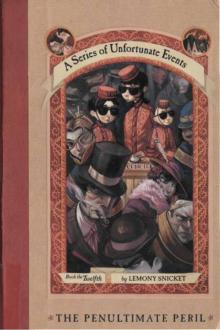 The Penultimate Peril
The Penultimate Peril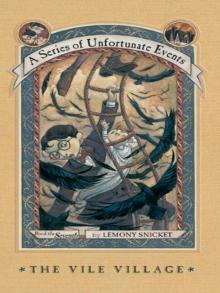 The Vile Village
The Vile Village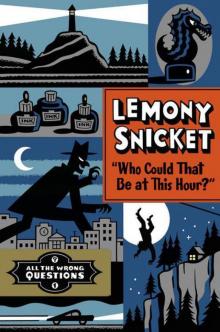 Who Could That Be at This Hour?
Who Could That Be at This Hour?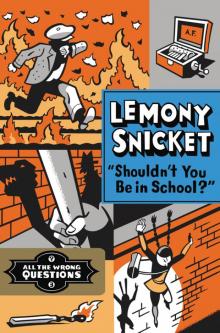 Shouldn't You Be in School?
Shouldn't You Be in School?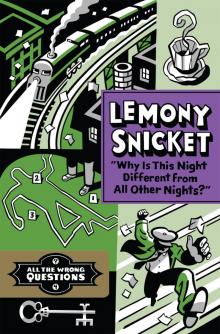 Why Is This Night Different From All Other Nights?
Why Is This Night Different From All Other Nights?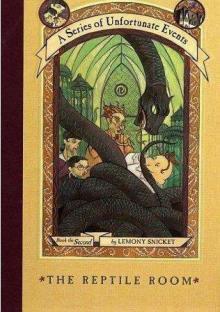 The Reptile Room
The Reptile Room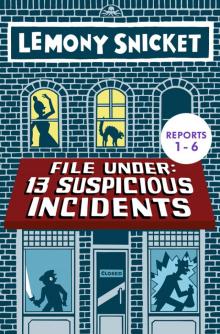 File Under: 13 Suspicious Incidents (1-6)
File Under: 13 Suspicious Incidents (1-6) The End
The End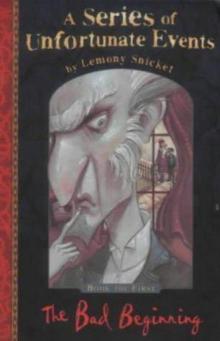 The Bad Beginning
The Bad Beginning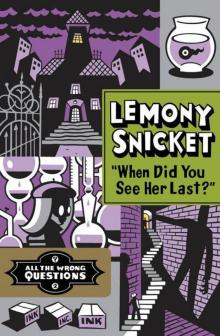 When Did You See Her Last?
When Did You See Her Last?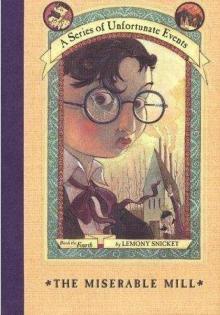 The Miserable Mill
The Miserable Mill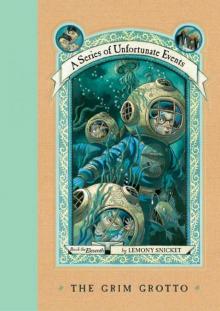 The Grim Grotto
The Grim Grotto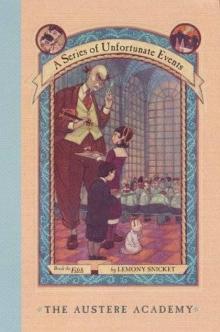 The Austere Academy
The Austere Academy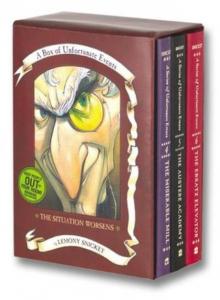 The Ersatz Elevator
The Ersatz Elevator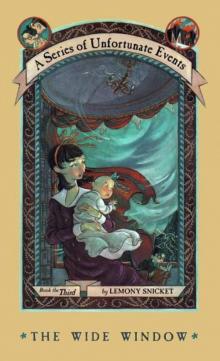 The Wide Window
The Wide Window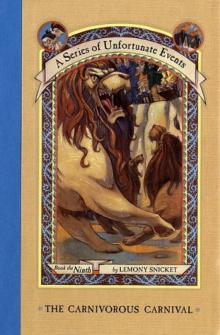 The Carnivorous Carnival
The Carnivorous Carnival A Series of Unfortunate Events Box: The Complete Wreck
A Series of Unfortunate Events Box: The Complete Wreck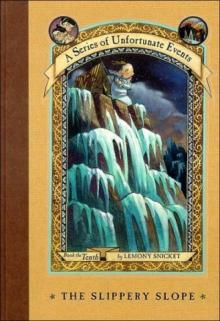 The Slippery Slope
The Slippery Slope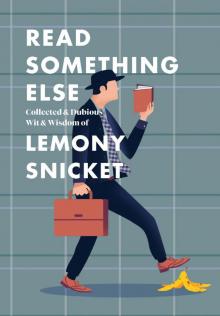 Read Something Else
Read Something Else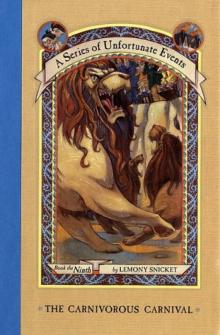 The Carnivorous Carnival asoue-9
The Carnivorous Carnival asoue-9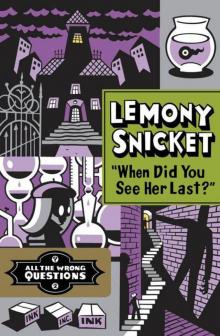 When Did You See Her Last
When Did You See Her Last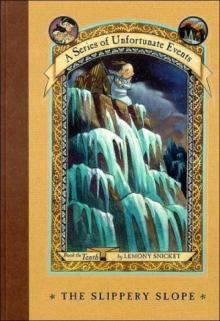 The Slippery Slope asoue-10
The Slippery Slope asoue-10 The Hostile Hospital asoue-8
The Hostile Hospital asoue-8 A Series of Unfortunate Events Collection: Books 1-13 with Bonus Material
A Series of Unfortunate Events Collection: Books 1-13 with Bonus Material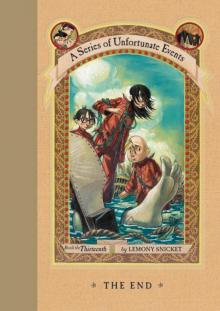 The End asoue-13
The End asoue-13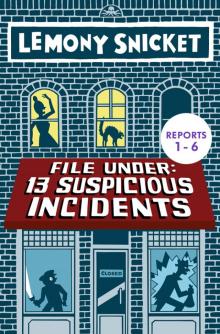 File Under
File Under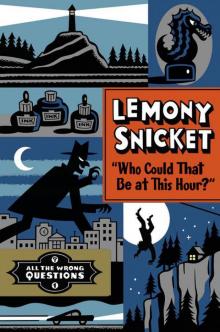 Who Could That Be at This Hour? (All the Wrong Questions)
Who Could That Be at This Hour? (All the Wrong Questions)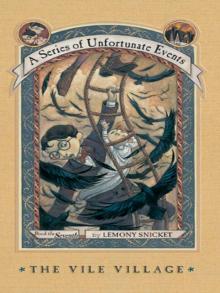 The Vile Village asoue-7
The Vile Village asoue-7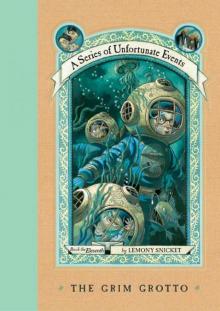 The Grim Grotto asoue-11
The Grim Grotto asoue-11